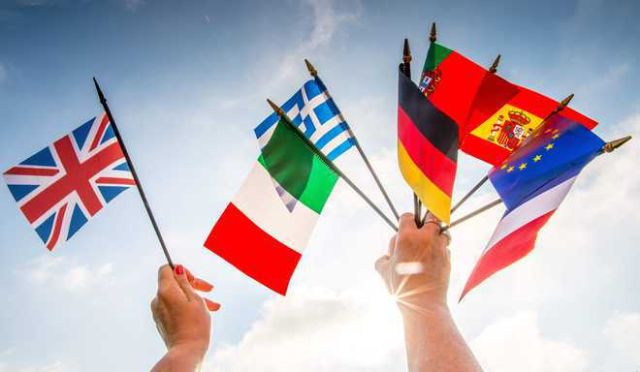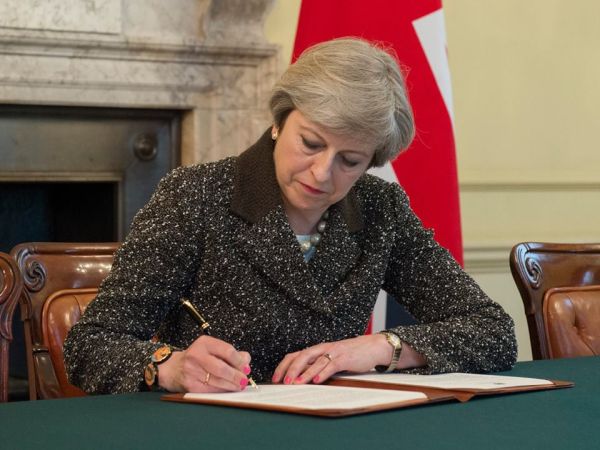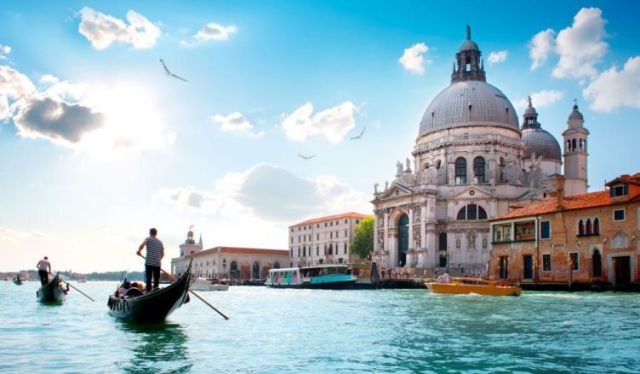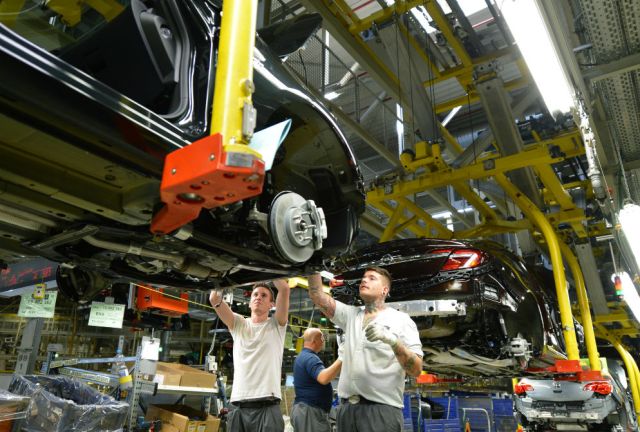
by admin | May 25, 2021 | Business Summit, Events, Social Round-up, World
 Brussels : The leaders of the 27 countries that will remain in the European Union (EU) after Britain’s withdrawal called off an extraordinary summit on the Brexit in November due to insufficient progress to organise the meeting.
Brussels : The leaders of the 27 countries that will remain in the European Union (EU) after Britain’s withdrawal called off an extraordinary summit on the Brexit in November due to insufficient progress to organise the meeting.
“For now, the 27 are not planning to organise an extraordinary summit on Brexit in November,” European sources said on Wednesday.
Those same sources said that the leaders stand “ready” to convene a European Council, “if and when” the EU’s chief negotiator, Michel Barnier, reports that “decisive progress” has been achieved, reports Efe news.
The Heads of State and Government of the 27 met in Brussels on Wednesday to hear a statement delivered by the British Prime Minister Theresa May, on the Brexit and then, without the UK, discussed how to proceed with the negotiations less than six months away from the planned British exit.
Brussels had planned to close the withdrawal agreement with the British government in October so the the European Parliament and Westminster parliament could ratify it before March 29, when Brexit will materialize.
During the informal summit in Salzburg in September, the President of the European Council, Donald Tusk, already said that the October meeting would be “the moment of truth” for the negotiations and that by then he hoped “the maximum progress and result”.
“If we feel that we will be able to finalise and formalise our agreement in November, I will convene this extraordinary meeting”, which would take place on November 17 and 18, the Polish politician said last month.
However, on October 14 London and Brussels failed to close an agreement and decided to stop negotiations
This Wednesday, the Heads of State and Government of the 27 reaffirmed their “total confidence” in the community negotiator, Michel Barnier, and their determination to remain united.
—IANS

by admin | May 25, 2021 | World

British Prime Minister Theresa May
London : The British government on Thursday published the long-awaited white paper on Brexit seeking to create a free trade area with the EU. Prime Minister Theresa May said it delivers on the Brexit vote.
The 98-page document, titled “The Future Relationship between the UK and the EU”, was published amid chaotic scenes in the House of Commons. It spelled out that workers from the other 27 EU member states will be able to travel to Britain visa-free to take up temporary employment, the Guardian reported.
It also stated that businesses that provide services will be able to move their talented people to and from Europe and Britain. Media reports in London said the white paper had been amended to soften the restrictions on Europeans coming to Britain after Brexit.
Dominic Raab, newly-appointed Brexit Secretary after the shock resignation of David Davis, gave details of the proposals to MPs in the Commons. The release of the document sparked chaotic scenes when it became apparent that copies of the paper were not immediately available to MPs.
He described the proposals as a “principled and practical Brexit”, describing the white paper as “the most significant Brexit publication” since the referendum in 2016.
Asked if there was a possibility of no-deal being struck between the EU and Britain, Raab said every eventuality was being planned for, but his aim was to see a future trade deal with Brussels.
May said the document “delivers on the Brexit people voted for”. But, pro-Brexit politicians vowed to table amendments saying May’s plan did not amount to Britain fully leaving the EU. It will see Britain leaving the European single market and the customs union.
The Department for Exiting the EU said the document proposed “a free trade area for goods that ensured continued frictionless access at the border, protected jobs and livelihoods and ensured Britain and EU meet their shared commitments to Northern Ireland and Ireland”.
Raab said the white paper outlined a vision that respects the result of the referendum and delivers a principled and practical Brexit. “It would maintain frictionless trade in goods between the UK and the EU through a new free trade area, responding to the needs of business,” he said.
Tory Brexiteer Jacob Rees-Mogg said it was a “bad deal for Britain”.
EU’s chief negotiator Michel Barnier said he would analyse them (proposals) with the European Parliament and member states and was “looking forward” to negotiations with the UK next week.
—IANS

by admin | May 25, 2021 | Opinions
 By Saeed Naqvi,
By Saeed Naqvi,
Pardon the postscript first. With the appointment of Giuseppe Conte, a lawyer, as a compromise Prime Minister of Italy, the wheel has come full circle. But before the Italian see-saw could stabilise, Spains Mariano Rajoy has thrown in his towel in the face of corruption charges that actually never left him since 2015. Establishments in Italy as well as Spain have been mauled in recent days by Peoples Power. This Peoples Power has been given an insulting name by the rulers — “Populism”.
Meanwhile herewith the column I wrote from Rome yesterday (Thursday) before travelling to the troubled countryside.
From the terrace bars, Rome’s current vogue, the monuments look mysterious in soft light even as St. Peters towers above all. But this panoramic grandeur disguises the tumult into which Italy has been tossed after President Sergio Mattarella, a judge by training, refused to swear in Paolo Savona, the 83-year-old economics professor who is staunchly against the European Union (EU).
Savona’s name had been proposed by the victorious alliance which came to power following the elections in March. The Five Star Movement is anti-austerity and anti EU; the League is sharply xenophobic on the migrant issue.
While the Interim Prime Minister Giuseppe Conte was more of Five Star nominee, the Finance Minister rejected by President Mattarella shared the League leader, Matteo Salvini’s anti-German bent. A growing anti-German sentiment is becoming part of Italy’s political rhetoric. Matteo Salvini pulls no punches on that score.
“German newspapers call us beggars, ungrateful, lazy, freeloaders and they want us to choose a Finance Minister they like.”
Alessandro Gilioli, Deputy Editor in Chief of the influential L’Espresso, was candid. He thought that the Leader of the Five Star, Luigi Di Maio, who never sought a Euro exit, would have been amenable to a compromise even in the first round negotiations with President Mattarella last week. But Di Maio could not have stuck his neck out with a softer line on Europe: That would have been a huge advantage to the League. An almighty competition in radicalism is on between unlikely competitors.
President Mattarella, a Europhile, acting under heaven knows what impulse or pressure, invited a 64-year-old IMF official Carlo Cottarelli to become Interim Prime Minister. This was like a red rag to the Five Star-League bull. Mattarella came under further pressure to reverse the decision which would have given the coalition a formula to grow exponentially in the next elections.
An even more muscular, menacing combination of Five Star and the League would be, in the perception of Brussels, not the medicine that the doctor had ordered for Italy, the world and certainly for the EU, which is still reeling from the Brexit blow and looking at disturbing developments in Spain. An Itexit would be a disaster of unimaginable proportions. So all the world’s establishments leaned on the President to open up consultations which have resulted in the reappointment of Conte. The compromise is: Conte minus Savona. What is being attempted in Italy is to delay the day of reckoning — when People disgusted with established parties will install their representatives whom the rulers continue to call Populist.
Consider what happened in Spain. In 2015, Pablo Iglesias, with his communist portfolio, riding a crest of Podemos (Yes We Can, echoes of Obama’s first campaign) burst upon the Spanish scene on a platform to get rid of Rajoy, noted for corruption even then.
Look how Rajoy managed to stay on until the latest vote. The stop-gap Prime Minister Pedro Sanchez of the declining socialist party standing on rotten stilts will fall sooner rather than later. Will that be the end of the Establishment in Spain? As an insurance, a Centre-Right youth party, Ciudadanos, Citizen’s Party, has been floated successfully, borrowing Podemos’s aesthetics. Its leader, Albert Rivera, has boosted his image on a nationalist platform opposing Catalan independence.
Remember also how the world’s progressive groups had built castles in the air when Alexis Tsipras of Greek communists, Syriza, promised the utopia where “austerity” will be forever banished? Today he is a contented poodle in the German lap.
But the new turn in European affairs seems to suggest that Tsipras too might be a nine days wonder. In fact, Yanis Varoufakis, the former Finance Minister, whom he sacked under German and EU pressure, has resurrected himself on the platform which Tsipras discarded. On Mattarella’s initial undemocratic action, Varoufakis was scathing. “By grounding their candidate for Finance, you have given a fantastic gift to populist forces.”
“You said nothing when the League leader Salvini named himself the Minister for Interior, when he was committed to throwing out 5,00,000 immigrants?”
During the Cold war, Christian Democrats were kept in power by the entire Western alliance. Italy at this period had a much loved Communist party which, paradoxically, was considered a taboo for power — at least while the Soviets were around. Soviet collapse, by that token, deprived the CD of its blackmail card to stay in power.
Italy’s conscientious judges, who had held their fire for fear of unsettling a system which had served as a bulwark against the global Left, now began to investigate the corruption in which the Italian power structure was sunk neck deep. From 1992 onwards, hundreds of politicians, civil servants, businessmen went to jail for brazen corruption.
When Berlusconi became Italy’s Prime Minister in 1994, he owned every TV channel. Naturally, the media backed him to the hilt during his subsequent spells in power. Over a decade ago, a comedian Beppe Grillo started a blog to engage young people on basic issues like technology, water, pollution, unemployment, economic distress. Italians, suffocated by Berlusconi’s self-serving media monopoly, built an internet revolution on the platform created by Grillo’s blog. This is the platform on which the current alternative Italian political structure is being erected.
There may be differences in detail, but Europe these days is convulsed by two currents fiercely opposed to each other: People’s Power, from the Left and the Right (disparagingly named “Populism”), is out to dethrone the established order. Until the other day this order seemed invincible: The Establishment had many instruments in its toolkit. But developments in Spain suggest that the seemingly invulnerable are running out of steam. Change and status quo are in conflict on an unprecedented scale.
(A senior cmmenator on political and diplomatic affairs, Saeed Naqvi can be reached on saeednaqvi@hotmail.com. The views expressed are personal)
—IANS

by admin | May 25, 2021 | Corporate, Corporate Buzz, Corporate Jobs, Employment, World
 Berlin : A hard Brexit might endanger 14,000 of the 42,500 jobs in German car industry, a report published by the consulting firm Deloitte showed on Thursday.
Berlin : A hard Brexit might endanger 14,000 of the 42,500 jobs in German car industry, a report published by the consulting firm Deloitte showed on Thursday.
German automobile industry could expect a loss of up to $4.6 billion in the Brexit year, because of the close interdependence of the suppliers with carmakers in Germany, Britain and other European Union countries, said the report named “hard Brexit and supply chain”.
Every fifth car parts used in Britain originates from Germany. German manufacturers supply the British automobile industry directly, and are indirectly involved in the production of German and other European cars exported to Britain, Xinhua reported.
The jobs at risk are all at suppliers to carmakers, should Britain’s negotiations with the EU about their future relationship collapse without a deal.
A no-deal Brexit would lead to the introduction of tariffs and a possible crash in the value of the British pound, making British companies less able to purchase imports.
The sales slumps affect the supply chain indirectly and lower revenue and employment for German suppliers.
“In the Brexit year 2019, a hard Brexit would cause sales of German suppliers to shrink by 23 per cent from 16.4 to 12.6 billion euros, which represents a decline of around 5 per cent of German suppliers’ current total turnover,” Deloitte chief economist Alexander Boersch said.
—IANS

by admin | May 25, 2021 | Markets, Online Marketing, Social Media, Technology, World
 London : Downplaying claims that Kremlin-backed groups helped swing the Brexit vote in 2016, Facebook has told EU investigators that less than one pound was spent by Russians on ads posted on its platform during the referendum, The Telegraph reported on Thursday.
London : Downplaying claims that Kremlin-backed groups helped swing the Brexit vote in 2016, Facebook has told EU investigators that less than one pound was spent by Russians on ads posted on its platform during the referendum, The Telegraph reported on Thursday.
On the other hand, Twitter disclosed that Russian-backed accounts spent $1,031.99 to buy six Brexit-related ads on its platform.
Facebook responded to the UK Electoral Commission, saying the Internet Research Agency, a shadowy organisation with links to the Russian government, spent just $0.97 (73 pence) during the EU referendum campaign.
“Damian Collins, the chair of the Digital, Culture, Media and Sport (DCMS) Committee, accused Facebook of failing to probe the true extent of Russian meddling,” the report added.
Collins said Facebook “had only identified adverts from pages that had already been discovered in the US investigation, and that studies showing thousands of Twitter bots had attempted to disrupt the vote were strong evidence that there was Russian meddling”.
Earlier in November, a group of data scientists found 156,252 Russian accounts on Twitter which mentioned #Brexit and posted nearly 45,000 messages related to the EU referendum in the 48 hours around the vote.
In the US, Facebook, Twitter and Google are facing intense fake news scrutiny after disclosing the details about the presence of Russian political ads, tweets and posts on their platforms during the presidential election in 2016.
The Kremlin-linked Russian organisations purchased more than $100,000 of ads on social media platforms during the 2016 US presidential election.
Facebook told US Congress in November that 126 million of its users in the US might have seen ads produced and circulated by Russian operatives.
According to Collins, “no work has been done by Facebook to look for Russian activity around the EU referendum”.
Meanwhile, Twitter told the Electoral Commission that the ads in question were purchased during the regulated period for political campaigning in the June 2016 EU Referendum — specifically from April 15 to June 23, 2016, TechCrunch reported.
British Prime Minister Theresa May has accused Russia of meddling in the elections and planting fake stories.
According to data scientists from Swansea University in Wales and the University of California, Berkeley, over 150,000 Russian accounts who were posting about the Ukrainian conflict swiftly started tweeting about Brexit in days leading up to the 2016 vote.
Political events like the Brexit referendum and the US presidential election have observed the use of social bots in spreading fake news and misinformation, the data scientists observed.
—IANS

 Brussels : The leaders of the 27 countries that will remain in the European Union (EU) after Britain’s withdrawal called off an extraordinary summit on the Brexit in November due to insufficient progress to organise the meeting.
Brussels : The leaders of the 27 countries that will remain in the European Union (EU) after Britain’s withdrawal called off an extraordinary summit on the Brexit in November due to insufficient progress to organise the meeting.



